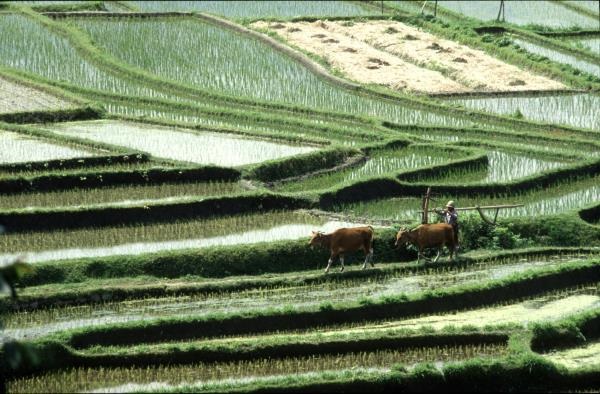Facing many challenges, Asia-Pacific governments convene to determine a course toward future food security
7 March 2016, Putrajaya, Malaysia - With the future of food security and undernutrition in question across the world's most populous region, governments from 46 Asia-Pacific countries have convened in Malaysia to consider corrective actions to safeguard the nutrition and well-being of this generation and beyond.
Delegates to the 33rd FAO Regional Conference for Asia and the Pacific include Government Ministers and senior officials who, over the course of five days, will discuss a broad range of food and agriculture-related issues. These include the present state of food production across this vast region, and ways to boost nutrition and end child stunting while curbing the growing rates of obesity. The delegates will also examine the challenges facing intensification of fisheries and aquaculture and the need to connect smallholder farmers to value-chains to improve their food-security and livelihoods, as they produce the majority of the food we eat.
"The conference in Putrajaya is particularly important, as it is the first one to be held for the region after the approval of the Sustainable Development Goals (SDGs) at the United Nations last September," said José Graziano da Silva, Director-General of the Food and Agriculture Organization of the United Nations (FAO).
"Food security, nutrition and sustainable agriculture are vital to achieving the entire set of SDGs by 2030. We hope Asia-Pacific countries will come out of this conference with a greater focus, sense of purpose and opportunity for collaboration to kick off their efforts towards these aspirations," Graziano da Silva said, in advance of the opening session of the regional conference.
Asia-Pacific region meets hunger target, but many challenges remain
As a whole, with food production high and food costs generally low, the Asia-Pacific region has fared very well in recent decades, particularly with respect to reducing the proportion of hunger by half since 1990 and meeting the MDG hunger goal. But the region still remains home to 490 million undernourished people - some 62 percent of the world's total.
Continued population growth and rising incomes (which lead to more demand for meat) mean that the world will need to produce 60 percent more food to feed a population in excess of nine billion people by 2050 - with up to 80 percent more food production required in developing countries. Most of that demand will come from the Asia-Pacific region, and all that increased production will need to overcome obstacles like changing temperatures and rainfall patterns created by climate change and natural disasters.
Asia-Pacific region at a food-production crossroad
"This region has done remarkably well in reducing hunger and poverty," said Kundhavi Kadiresan, FAO Assistant Director-General and Regional Representative for Asia and the Pacific. "But we now find ourselves at a major crossroad. We must find ways to end the hunger of hundreds of millions of people in Asia and the Pacific, while at the same time increasing production of nutritious foods sustainably, and in ecologically acceptable ways, for the future. Let's be clear, this is our duty. We owe it to our children - and we owe it to their children," she said.
The Regional Conference for Asia and the Pacific (#APRC33) is also carefully examining the demographic challenges facing agriculture. The average age of farmers has been on the increase for many years. Two of the main reasons for this are rural-urban migration trends and a decline in the number of young people entering the agriculture sector. The Conference will hold a roundtable discussion on why youth are not considering agriculture as a career, whether that means farming, fishing or studying agricultural sciences.
"Our youth are our best hope for finding solutions to the food deficits of the future," Kadiresan said. "There are brilliant young minds among us today who could be the food and agricultural innovators of tomorrow. We must give them the motivation to join us and we must invest in agricultural sciences now, so that it will pay off for all of us and our families in the not too distant future."
The 33rd FAO Regional Conference for Asia and the Pacific is currently underway in Putrajaya, Malaysia, hosted by the Malaysian Government's Ministry of Agriculture and Agro-based Industry. The first three days of the Conference are dedicated to technical discussions and consultations with senior government officials. On the fourth day, FAO Director-General, José Graziano da Silva, will address a Ministerial Session. The roundtable discussion on the future of youth in agriculture will take place on the final day. Civil society organizations will also participate in the Conference.
